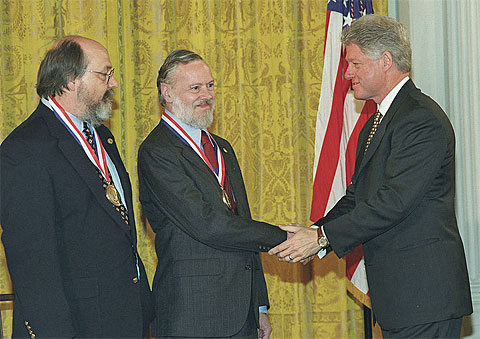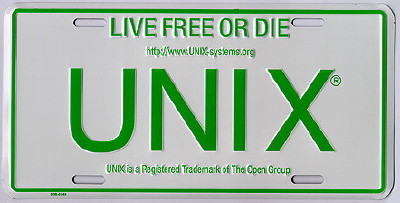 |
| [Solaris Logo, courtesy former Sun Microsystems] |
Abstract:
Packaging has long been the basis of modern Operating Systems, dating back to AT&T System V. Solaris adopted SVR4 packaging, when Sun Microsystems started growing from an Operating System needing a compiler to a production Operating System to be deployed. SVR4 Packaging was originally based upon the concept of a Stream (recorded upon Sequential Block infrastructures likes Tape) or a Tree (recorded Random Block infrastructures like Disk.) Sun Microsystems was astutely aware that "http" protocol was not much different from a "tape", where a stream of data was pulled down, and they upgraded SVR4 to support HTTP repositories with encryption and license keys. Somewhere along the way, Sun lost their way, and created a proprietary packaging system with fewer capabilities, called IPS, based upon the new command "pkg"... but Oracle is making the best of it. |
| [former OpenSolaris logo] |
The "pkg" Repository
The concept of a Package Repository with the Image Packaging System was introduced with OpenSolaris. The repository would be served up through a web server and secured with certificates. |
| [Oracle Logo, courtesy Oracle Corporation] |
Oracle pkg Repositories
There are two kinds of Oracle “pkg” repositories:
The document describing getting access to the support
repository:
http://www.oracle.com/technetwork/articles/servers-storage-admin/o11-018-howto-update-s11-1572261.html
http://www.oracle.com/technetwork/articles/servers-storage-admin/o11-018-howto-update-s11-1572261.html
The document describing the Solaris 11.2 Package Publisher info:
http://docs.oracle.com/cd/E36784_01/html/E36802/gijmo.html
http://docs.oracle.com/cd/E36784_01/html/E36802/gijmo.html
Checking Repository
The newly installed OS is using the Oracle Package Publisher
defaults to the Release Repository.
sun9876/root# pkg
publisher
PUBLISHER TYPE STATUS P LOCATION
solaris origin online F http://pkg.oracle.com/solaris/release/
Additional detail can be reviewed about Oracle’s “solaris”
release publisher:
sun9876/root# pkg
publisher solaris
Publisher: solaris
Alias:
Origin URI: http://pkg.oracle.com/solaris/release/
SSL Key: None
SSL Cert: None
Client UUID: 6367a630-fbe6-11e3-8701-5bf522237f54
Catalog
Updated: August 18, 2015 04:44:20 PM
Enabled: Yes
To check the current OS Release and Update – note:
installed is Solaris 11.2 (0.175 is Solaris 11) SRU
0
sun9876/root# pkg
info entire
Name: entire
Summary: Incorporation to lock all system packages to the same build
Description: This package constrains system package versions to the same
build. WARNING: Proper system
update and correct package
selection depend on the presence of this incorporation.
Removing this package will result in an unsupported system.
Category: Meta Packages/Incorporations
State: Installed
Publisher: solaris
Version: 0.5.11
Build
Release: 5.11
Branch: 0.175.2.0.0.42.0
Packaging Date: June 24, 2014 07:38:32 PM
Size: 5.46 kB
FMRI: pkg://solaris/entire@0.5.11,5.11-0.175.2.0.0.42.0:20140624T193832ZZ
To check the Oracle Release Repository
– note: available is Solaris 11.2 (0.175 is Solaris
11) SRU 1
sun9876/root# pkg
info -r entire
Name: entire
Summary: Incorporation to lock all system packages to the same build
Description: This package constrains system package versions to the same
build. WARNING: Proper system
update and correct package
selection depend on the presence of this
incorporation.
Removing this package will result in an unsupported system.
Category: Meta Packages/Incorporations
State: Not installed
Publisher: solaris
Version: 0.5.11
Build
Release: 5.11
Branch: 0.175.2.1.0.2.1
Packaging Date: September 23, 2014 10:49:40 PM
Size: 5.46 kB
FMRI: pkg://solaris/entire@0.5.11,5.11-0.175.2.1.0.2.1:20140923T224940Z
There are 148 updates available from the Oracle Release
repository.
sun9876/root# pkg
list -u | wc -l
148
To list the updates available:
sun9876/root# pkg
list -u | head
NAME (PUBLISHER) VERSION IFO
archiver/gnu-tar
1.27.1-0.175.2.0.0.42.1 i--
compress/bzip2
1.0.6-0.175.2.0.0.42.1 i--
compress/gzip
1.5-0.175.2.0.0.42.1 i--
compress/p7zip
9.20.1-0.175.2.0.0.42.1 i--
compress/pbzip2
1.1.6-0.175.2.0.0.42.1 i--
compress/pixz
1.0-0.175.2.0.0.42.1 i--
compress/unzip 6.0-0.175.2.0.0.42.1 i--
compress/xz
5.0.1-0.175.2.0.0.42.1 i--
compress/zip
3.0-0.175.2.0.0.42.1 i—
A dry-run of the update shows 8
packages updates available with release, and size
- no reboot required.
sun9876/root# pkg
update -nv
Packages to update: 8
Estimated
space available: 275.69 GB
Estimated space to be consumed: 65.63 MB
Create
boot environment: No
Create backup boot environment: Yes
Rebuild boot archive: No
Changed packages:
solaris
consolidation/sunpro/sunpro-incorporation
0.5.11,5.11-0.175.2.0.0.37.0:20140414T130238Z ->
0.5.11,5.11-0.175.2.1.0.4.0:20140728T200719Z
consolidation/userland/userland-incorporation
0.5.11,5.11-0.175.2.0.0.42.1:20140623T010405Z ->
0.5.11,5.11-0.175.2.1.0.2.0:20140723T184045Z
developer/assembler
0.5.11,5.11-0.175.2.0.0.37.0:20140414T130241Z ->
0.5.11,5.11-0.175.2.1.0.4.0:20140728T200720Z
entire
0.5.11,5.11-0.175.2.0.0.42.0:20140624T193832Z -> 0.5.11,5.11-0.175.2.1.0.2.1:20140923T224940Z
system/library/c++-runtime
0.5.11,5.11-0.175.2.0.0.37.0:20140414T130401Z ->
0.5.11,5.11-0.175.2.1.0.4.0:20140728T200722Z
system/library/math
0.5.11,5.11-0.175.2.0.0.37.0:20140414T130409Z ->
0.5.11,5.11-0.175.2.1.0.4.0:20140728T200728Z
system/library/mmheap
0.5.11,5.11-0.175.2.0.0.23.0:20130916T153150Z ->
0.5.11,5.11-0.175.2.1.0.4.0:20140728T200732Z
system/library/openmp
0.5.11,5.11-0.175.2.0.0.37.0:20140414T130412Z ->
0.5.11,5.11-0.175.2.1.0.4.0:20140728T200733Z
To update from 11.2.0 to 11.2.1 (which was the latest at the time of this article publishing):
sun9876/root# pkg
update
Management through Ops Center
If the operating system instance is managed through Ops Center, the publisher repositories are changed, and patching can be done centrally.
Ops Center server is the local proxy, holding patches &
packages from Oracle
sun5582/dh127087$ pkg publisher
PUBLISHER TYPE STATUS P LOCATION
solaris origin online F https://oracle-oem-oc-mgmt-sun9999:8002/IPS/
cacao origin online F https://oracle-oem-oc-mgmt-sun9999:8002/IPS/
mp-re
(non-sticky) origin online F https://oracle-oem-oc-mgmt-sun9999:8002/IPS/
opscenter origin online F https://oracle-oem-oc-mgmt-sun9999:8002/IPS/



















